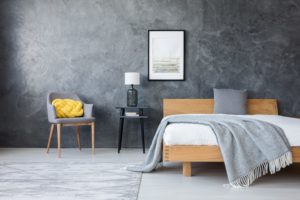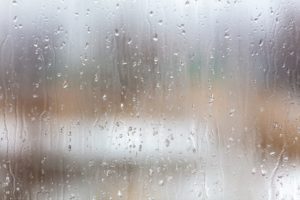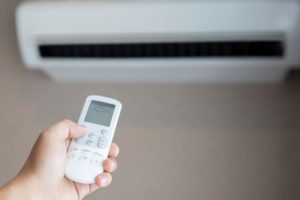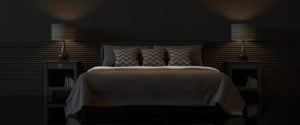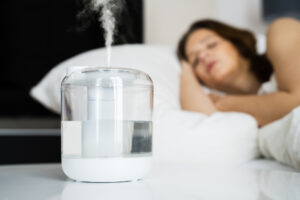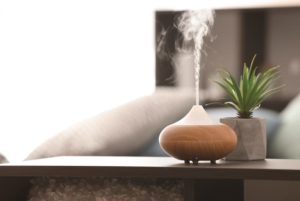Using an Air Purifier for Better Sleep
Research suggests that indoor air quality may play a significant role in the quality of a person’s sleep. Pollutants and airborne particles in the bedroom can contribute to allergies and other problems that interfere with a good night’s rest.
To improve indoor air quality, experts suggest removing the sources of pollution, increasing ventilation coming from outside the home, and using air purifiers to filter out unwanted indoor pollutants. For those interested in using an air purifier to get better rest, we cover how an air purifier can help, types of air purifiers, and tips for finding the right model.
Improve Air Quality
Air purifiers reduce airborne pollutants that lead to poor sleep and other health issues by trapping or neutralizing substances or gasses in the air. Depending on the type of air purifier, the unit may trap particles or gasses using a specialized filter, electrical charge, or ultraviolet light.
Different types of air purifiers are designed to address specific indoor pollutants. Indoor air pollutants can come from a variety of sources, but are generally separated into either particulate matter or gaseous pollutants. Particulate matter includes dust, animal dander, mold, bacteria, and viruses, while gas pollutants can come from stoves, car exhaust, and smoke.
Minimize Allergen and Asthma Triggers
Nighttime allergy symptoms–like nasal congestion, irritation in the nose and throat, and coughing–can make it difficult to sleep and increase the risk of snoring and other sleep-related breathing issues like sleep apnea. Exposure to particulates like dust mites, pest and pet dander, mold, and fungi can also increase the risk of a nocturnal asthma attack.
Studies suggest that air purifiers that contain HEPA filters are effective at reducing some symptoms of allergies and asthma. High-Efficiency Particulate Air (HEPA) filters trap allergens and particulates in the air, making it less likely that they’ll be inhaled during sleep.

Cut Down on Odors
Unpleasant odors can quickly disrupt a person’s sleep environment. Disruptive scents can originate from a variety of sources, such as tobacco smoke, pets, cooking, or volatile organic compounds from household items. Over time, persistent odors can become embedded in room fabrics, making the bedroom a less inviting place for relaxation and rest.
Air purifiers equipped with carbon filters are especially adept at neutralizing certain odors . Carbon filters operate by adsorbing the odor-causing molecules from the air, resulting in a fresher smelling sleeping environment.
Increase White Noise
White noise describes having a consistent background sound in the bedroom that masks other sounds in the environment. White noise can mask disruptive sounds such as traffic, voices, or the ticking of a clock that can disrupt a person’s sleep. For many, the subtle hum or gentle whooshing of an air purifier can reduce distractions and provide a soothing environment for sleep.
Types of Air Purifiers
Shoppers can choose from a wide range of portable air purifiers, many of which are designed to filter or clean the air in one room.
- HEPA filters: HEPA filters are a popular choice for portable air purifiers, as they remove more than 99.97% or particulates like bacteria, pollen, dust, and mold.
- Carbon and gas filters: Certain types of filters, such as carbon filters, are designed to remove gaseous pollutants from indoor air. Some air purifiers may contain both a HEPA and a carbon filter to remove both particulates and gasses.
- Ionic cleaners: Ionic air purifiers use an electrical charge to reduce particulate matter in the air.
- UV cleaners: Several types of air purifiers use ultraviolet (UV) light to kill microorganisms or render them harmless. Because UV cleaners don’t reduce particulates in the air, they aren’t a replacement for air purifiers that contain filters.
Air filters can also be used in central furnaces, air conditioners, and other HVAC systems that move air throughout an entire house or building. These filters are also available in a variety of types and serve a similar function to portable air purifiers.
“When picking an air purifier to use in your bedroom, the amount of noise it produces is an important consideration when choosing the right model.”
Dr. Dustin Cotliar, Sleep Physician
Choosing an Air Purifier for Sleep
When shopping for an air purifier, it’s important to understand that no single model can remove all indoor pollutants. Shoppers should look for an air purifier that is engineered to target specific particulates or gasses in the home.
For filtering out particulates, experts suggest choosing a model based on the size of the room. This means taking into account the air purifier’s clean air delivery rate (CADR), which describes the speed at which an air purifier can clean the air.
| Room Size | Minimum CADR |
|---|---|
| 100 square feet | 65 |
| 200 square feet | 130 |
| 300 square feet | 195 |
| 400 square feet | 260 |
| 500 square feet | 325 |
| 600 square feet | 390 |
| 700 square feet | 450 |
| 800 square feet | 515 |
| 900 square feet | 580 |
Other factors to consider when choosing an air purifier is its price, warranty, features, and maintenance needs. It’s important to remember that all air purifiers require cleaning and maintenance. Proper maintenance of a portable device can have a significant impact on its ability to purify the air.
References
4 Sources
-
United States Environmental Protection Agency. (2018 July). Guide to Air Cleaners in the Home (2nd Ed.)., Retrieved September 10, 2023, from
https://www.epa.gov/sites/default/files/2018-07/documents/guide_to_air_cleaners_in_the_home_2nd_edition.pdf -
United States Environmental Protection Agency. (2008 May). Guide to Air Cleaners in the Home., Retrieved September 10, 2023, from
https://www.epa.gov/sites/default/files/2014-07/documents/aircleaners.pdf -
United States Environmental Protection Agency. (2023, March 13). What is a HEPA filter?, Retrieved September 10, 2023, from
https://www.epa.gov/indoor-air-quality-iaq/what-hepa-filter -
Park, G. ( n.d.). How to Choose a Room Air Cleaner. ENERGY STAR., Retrieved September 10, 2023, from
https://www.energystar.gov/products/ask-the-experts/how-to-choose-a-room-air-cleaner



